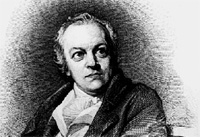|
|
2. William Blake (1757-1827)
 William Blake was born on 28th November 1757, the third son of a poor hosier
in London. His life started off odd and never improved. As a child, Blake
viewed the world in the light of what Wordsworth, in his Ode: Intimations
of Immortality, would later call a “visionary gleam.” At the age of
four, he had his first vision. Though his parents may have thought it was
all right at first, his father was very upset William was still having them
at eight. Unlike the child in Wordsworth’s poem, however, Blake never
outgrew these visions.
William Blake was born on 28th November 1757, the third son of a poor hosier
in London. His life started off odd and never improved. As a child, Blake
viewed the world in the light of what Wordsworth, in his Ode: Intimations
of Immortality, would later call a “visionary gleam.” At the age of
four, he had his first vision. Though his parents may have thought it was
all right at first, his father was very upset William was still having them
at eight. Unlike the child in Wordsworth’s poem, however, Blake never
outgrew these visions.
He received little formal
education but learned to read and write at home, and he also showed a great
aptitude for drawing. He was sent to a drawing school at age ten, and his
father arranged for William to be apprenticed to an engraver at his 14. And
then Blake earned his living as an engraver of illustrations for various
publishers. However, as a genius he was, he had been an artist at the age of
ten and a poet at twelve. Blake bought every print he could possibly afford.
He drew sketches of monuments throughout the London area. At the same time,
he also wrote some poetry. His first collection was the Poetical Sketches
(1783), a group of lyric poems written between the ages of twelve and
twenty. Though mostly derivative of other poets’ work, these early poems
show the beginning of the Romantic ideas of emotion over form. William
attended the Royal Academy after finishing his apprenticeship and was soon
able to support himself by his engraving. On 18 August 1782, he married a
woman named Catherine Boucher who accepted the visions that William was
still having with no apparent qualms.
In 1789, Songs of Innocence was
published, and in 1794, Songs of Experience was published--- which
two show “two contrary states of the human soul”. William also designed
illustrations for these poems. The Marriage of Heaven and Hell,
written about this time, was William’s first really offbeat work. One thing
that might have inspired this change in William’s work was his study of the
philosopher
Emanuel Swedenborg, who stated his belief that the year 1757
(the year of William’s birth) would mark a grand “New Age” which would allow
mankind to regain moral freedom.
Except writing his poetry, William earned extra
money by teaching drawing to the sons of his friends. One of these friends,
Sir Thomas Butts, kept William from poverty for many years, through teaching
fees and out gifts. Besides, in spite of the fact that he was not famous, he
won the patronage of Lady Caroline Lamb, and was then in a much better
financial position. His engravings were much prized by publishers and other
authors; however, Blake much appreciated the admiration he received from
younger artists towards the end of his life. His poetry, however, was not
appreciated much until after authors such as Coleridge rediscovered him.
After several years of failing health (he suffered
shivering fits and jaundice from 1824 on, symptoms of the gallstones which
would later kill him), William died on 12 August 1827, singing to his wife
of what he saw of heaven.
From Poetical Sketches to Songs of Innocence,
and then to Songs of Experience, it is clear of the process of
shaping his radical liberal thinking and maturing the artistic skill. The
later two collections are his most important poetic works that collect his
most well known poems. These two collections are “two contrary states of
human soul.” The poems in Songs of Innocence express the poet’s
delight in life, the Eden garden. Everything seems in its harmony. In the
contrary, the atmosphere in Songs of Experience is sad, gloomy.
Sufferings are flown out. Many poems in the two collections contradict each
other sharply. Although many verses bear the same title in these two books,
they are opposite in meaning. For example, although both of these books have
Nurse’s Song, the mood is completely different. The Nurse’s Song
in Songs of Innocence is musical, light-hearted, full of laugh, and
everything is harmonious:
“When the voices of children are heard on the green
And laughing is heard on the hill,
My heart is at rest within my breast
And everything else is still.
…………
The little ones leap’ed and shonted and laugh’d
And all the hills echoe’d.”

|
![]()
![]()